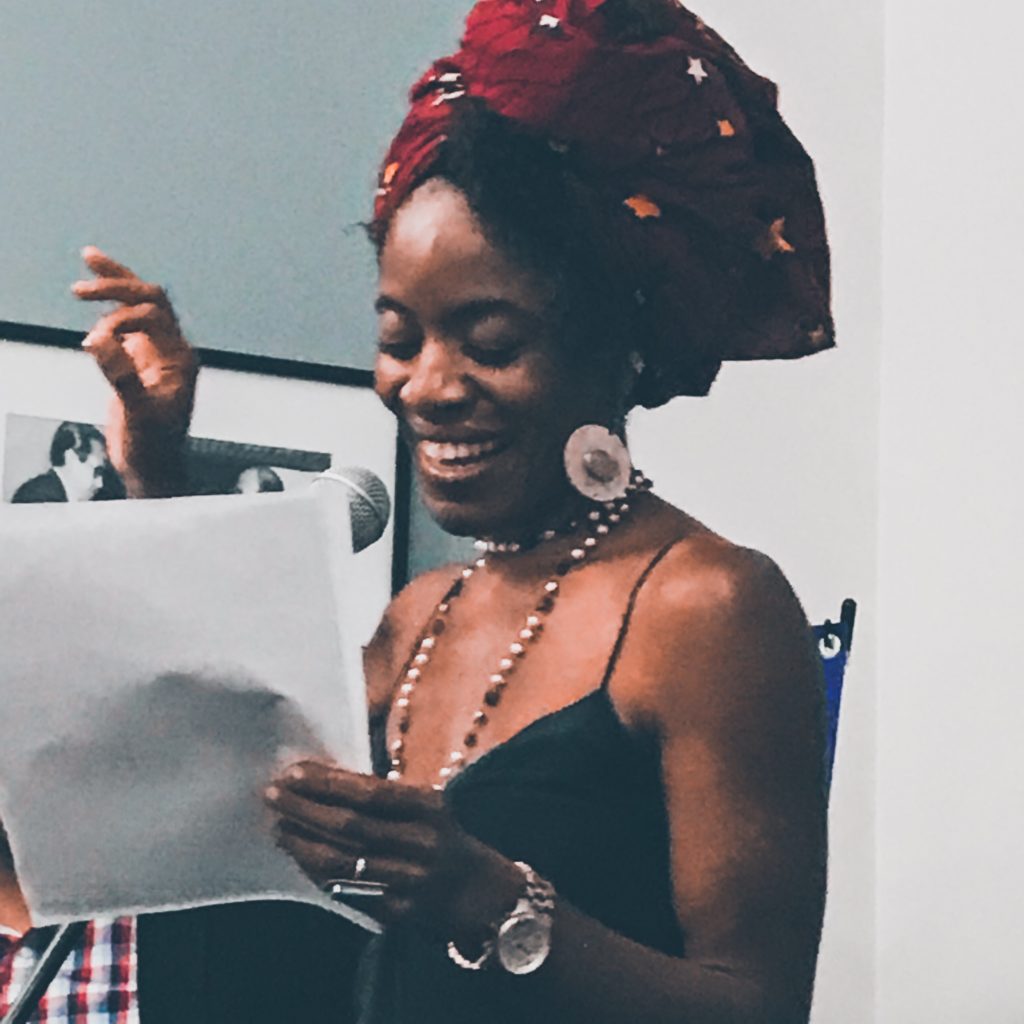
by Uchechi | Jan 17, 2019 | creativity
I was recently contacted by a teacher (and student) from Mexico City. The high school students are studying poetry, and the teacher wants to find more ways to engage the students. They asked me to answer these questions. My goal is to help them understand poetry and to feel more connected to it. If you are an educator, please use this as a guide to help you in your classroom. These questions were asked by the teacher.
How can students understand and feel poems?
- Read each poem aloud.
With each poem, ask the students to read it aloud. Then ask them to find one line they feel connected to. The line will serve as a thread they can pull from, a door and enter. Ask them to write down 1 line that connects them to something in their own experience.
- Use Diverse Examples Of Poetry
Some may not agree with this, but when I was a teacher I learned that connecting with students on their level was helpful. Don’t be afraid to use music as a reference. If your students prefer musicians to written poets, let them reference that and discuss how it relates to poetry.
The Personal Will Become Universal for New Poetry Students
I believe the personal is universal. Poetry is a collection of personal stories strung together by metaphor and a hunger to be seen while observing the world. In understanding some of the most personal stories of another human being, we begin to understand that nothing in our story is unusual. We live in different parts of the world at different times and have different eyes and different skin, but we all hunger for the same thing: to make meaning of our lives and the world around us. we want to know that our lives signify something.
This is how the students will understand a poem. They will find that one line that becomes a window or a door into their own world and they will remember that they also want to have significant life and have mattered to someone.
How can students feel inspired to participate in poetry class?
Write A Collective Poem
I suggest aking the students to write a collective poem, where each person contributes one line. I usually start with one line and pass the paper around until each student contributes something. Hopefully, this exercise will create community. Sometimes students feel shy to write a poem on their own, so this is a great way to involve everyone.
I think teachers should also participate and add a line.
How To Write A Collective Poem
- Start with one large piece of paper.
- Ask each student to contribute one line. They should not think too much about this. The line does not have to be perfect. They can write down anything that comes to their mind. This exercise should be fun.
- The teacher should also add a line to the poem.
- Pass the paper around the circle 1 or 2 times. It depends on how many students you have. If you have 30, then one time will work well. If you have 5, then I suggest passing the paper around 2 or 3 times.
Has poetry helped you in your work as a web designer and entrepreneur?
Approaching Web Design As A Digital Storyteller
Creating websites is a form of storytelling. Before I build or design anything, I try to find the story.What is the story each business is trying to tell? This work is (in part) digital storytelling. I use modern tools like coding, web design and digital marketing but it is the story that connects it all.
Good Web Design Is Good Storytelling
An impactful website tells a good story. That story then takes website visitors on a journey. At the end of that journey, your website visitors can choose to leave or arrive at a destination where they are asked to take action.
Businesses ask customers to buy from them, sign up for their newsletter, contact them or read their content.
The late poet Mary Oliver said this about poetry and professional life:
“Poetry isn’t a profession, it’s a way of life. It’s an empty basket; you put your life into it and make something out of that.”
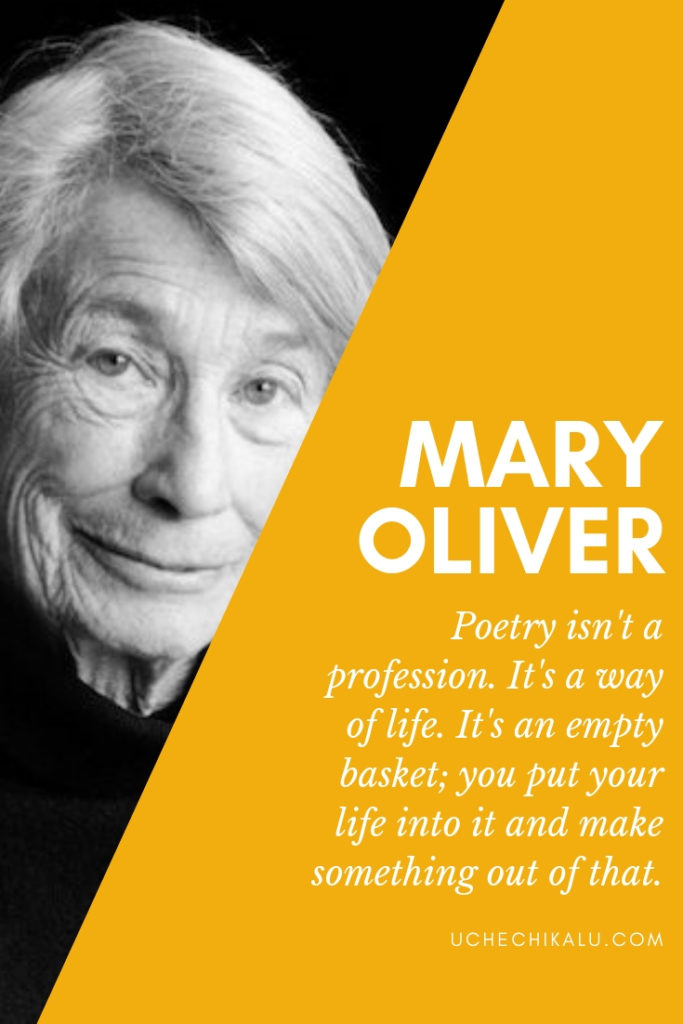
So yes, poetry does help me in my work as a web designer and entrepreneur. It gives me a perspective, a container through which I can put my work into. And that container helps me when I design from the perspective of a storyteller and a lover of language.
It also helps me when I speak at conferences and poetry festivals. My work as a poet prepared me for the public part of my tech work. Some days I design websites. Some days I also travel and speak at business conferences. When I walk onto the stage, I feel more confident because I have experience doing this as a poet.
I believe that we all so desperately need a perspective that informs how we connect with the world on a personal and professional level.
Poetry is my container and my worldview that informs (and enriches) the work I do.
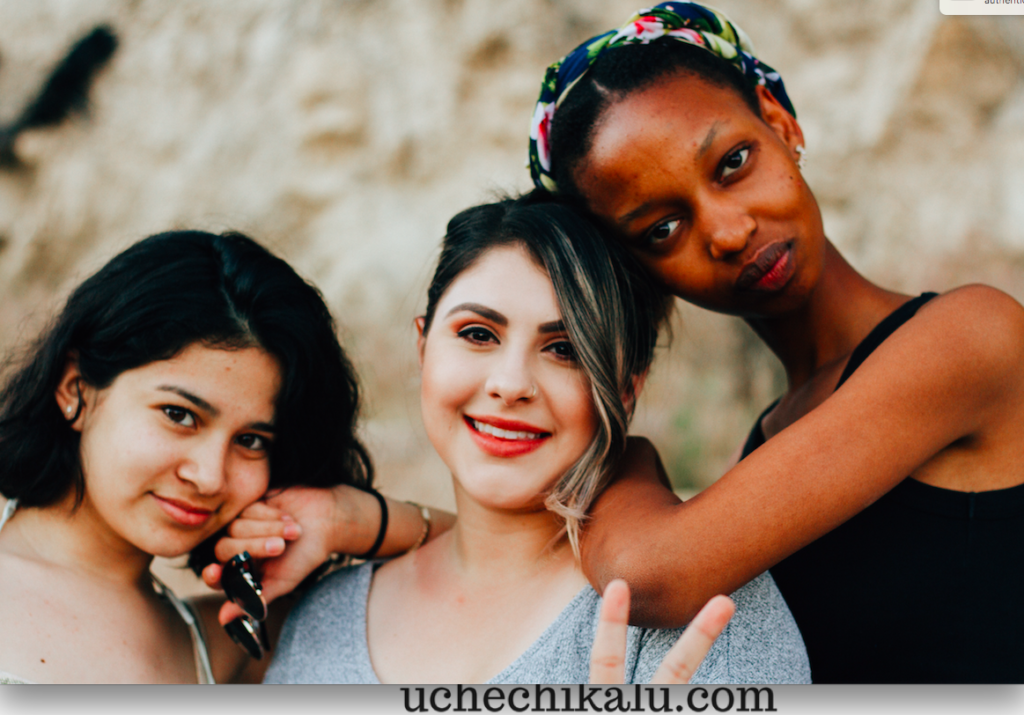
by Uchechi | Jan 16, 2019 | Blog
Dear Creative,
I want to encourage you to embrace your professional diversity.
We live in a world where we hyphenate ourselves when our cultural background includes many influences. We are encouraged to embrace our cultural diversity, understanding that the mix of backgrounds makes us richer, fuller human beings. But we don’t do the same when it comes to our professional diversity.
Let me tell you a story.
I have always loved the cultural celebration of weddings. I love the blending of families and cultures that come together to create something new. I love how the couple has to decide which cultures to keep, and which ones to let go of. I love knowing that no matter what they decide, they are embracing all of the cultural influences that have conspired to bring them together.
Why are we not encouraged to embrace our professional diversity in the same way?
Let me tell you a story.
I studied creative writing in college. I also work in technology as a UX Designer. I also own a software development company where I manage teams of designers, coders, and product developers. I’ve also co-founded a startup and hosted a Twitter chat about diversity in technology.
All of these things may seem so different, but they have actually taught me to embrace my professional diversity. When I take the stage at a tech conference, I am leveraging my years as a poet and how that experience prepared me to engage with an audience. When I build software, I am thinking about it through the lens of the poet, searching for the story first.
Like cultural diversity, your professional diversity is nuanced.
It is hyphenated and it allows you to bring a different (and new) perspective to your work.
We can do the same with our professional diversity. All of the different paths you’ve taken have value. Everything you studied gives you an opportunity to create more meaning in your work. Cultural diversity is often seen as valuable because it brings together of many cultural influences to make an experience and/or person richer. It is meshing together, a gathering of the best of each to make us better, more unique, more whole.
It is 2019. Most of us will not have the same job as our parents did. We will be hyphen-creatives, bringing our work from one discipline into the other and leveraging all that we have to offer. There will be people who tell you to pick one. This might work for you, but remember that almost no one has one job even if they have one specialty.
In 2019, the doctor is also a blogger. The blogger is also a photographer. The photographer might become a web designer just to get her website up and running. We are not chasing jobs. We are running towards one impact, and using every and any tool we can to get there.
Our work has to be multidisciplinary creativity. This is the future of creative work.
Embrace your professional diversity in the same way you would embrace your cultural diversity.
Remember the work that allows you to have your one and only impact.
Love,
Your Future Self
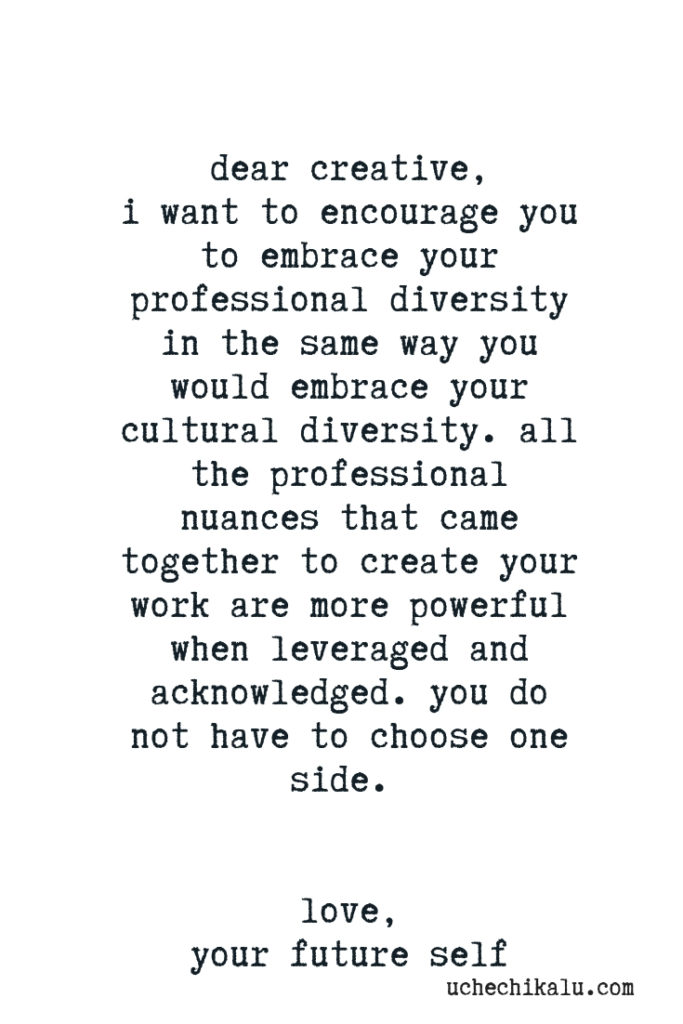
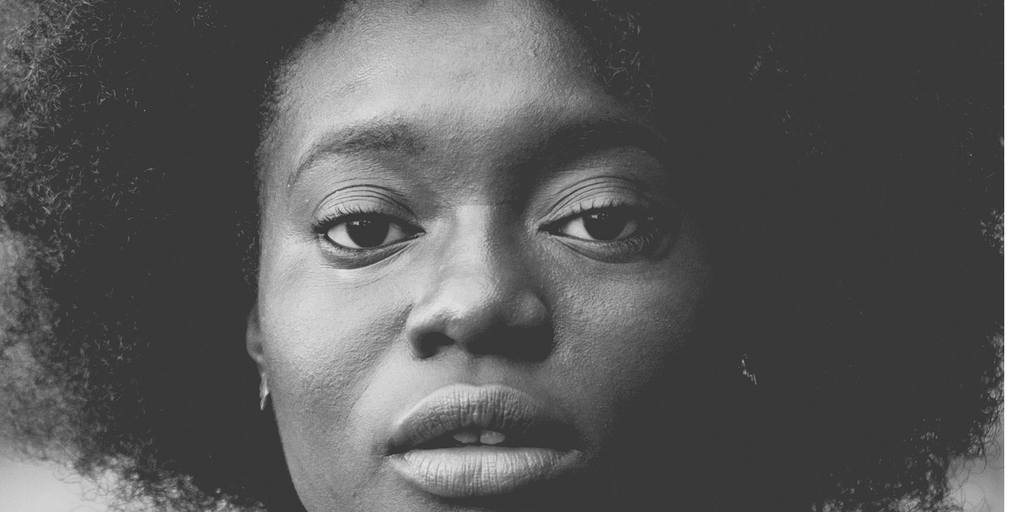
by Uchechi | Jan 9, 2019 | career coaching, creative confidence, creative resilience
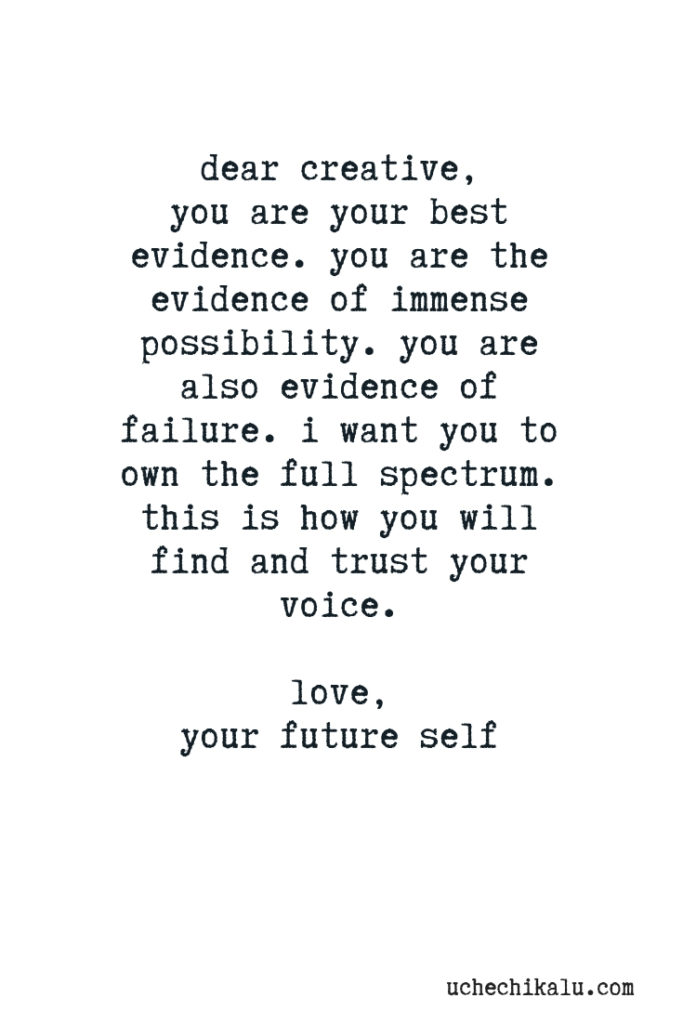
dear creative,
you are your best evidence.
you are the evidence of immense possibility. you are also evidence of failure. I want you to own the full spectrum of your creative experience. this is how you will learn to trust your creative voice and move forward when all the stories of imposter syndrome show up.
we live in a world that asks us to own our flaws but does not encourage the same when it comes to our greatness.
we’re afraid of appearing conceited or narcissistic. I’m afraid of that too. But I recently realized that I’m also afraid of living on one side of the creative spectrum where I only own the failures. This is not healthy either. This can lead to extreme self-doubt and paralysis.
in 2019, i want you to embrace the full spectrum of your creative work.
there will be days when I write inspiring (to others) poems and there will be days when my work fails. There will be days when I create beautifully designed websites and effective marketing strategies, and other days when I wonder if I should have stayed with writing instead of also incorporating technology.
and you will also have those days. I want to encourage you to own all of it. If you remember the failures with specificity, also remember the days you birthed something that felt incredible. Remember the awards in great detail. Remember the press mentions. Remember what you were wearing and what you said. Remember all of it.
you are creating a body of work.
Keep creating it, keep growing it and keep embracing the full spectrum of your creative out our.
don’t worry about being conceited. As soon as you celebrate one win, there will be a creative failure to greet you. This is the process. This is the work.
in the end, I want you to know the truth about your work: you’ve done some amazing work.
Remember that.
love,
your future self
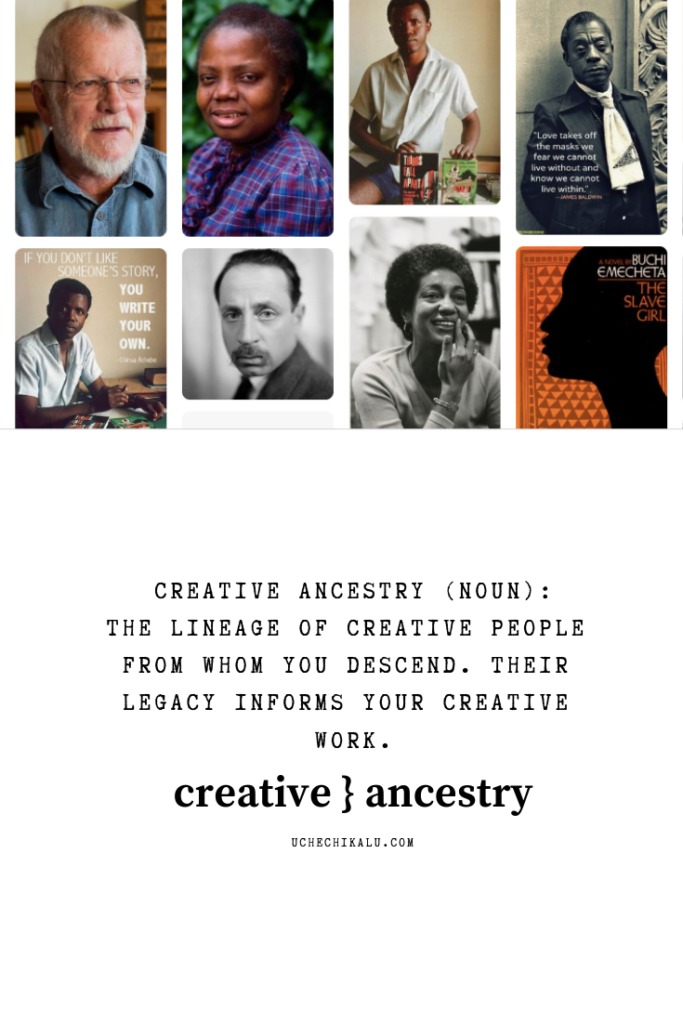
by Uchechi | Dec 3, 2018 | career coaching, creative resilience, creativity

Dear Creative,
I’ve been crying a lot lately. The grief comes in waves, and sometimes I feel like my whole body is soaking like a wet towel.
I miss my late younger brother. It’s been many years since he died. He taught me so much.
I am also missing the presence of the late Chinua Achebe in the world. He would have celebrated his 88th last month. He is known as the father of African literature. He is also a fellow Nigerian.
I am mourning the loss of my teachers. Achebe was one of them. Some of them I know by blood, and others became my mentors. I am also in awe of the work they were able to do, at a time when many of them had fewer opportunities than I do.
But more importantly, Achebe is my creative ancestor: Someone in my creative lineage who created worth that allowed me to see where I could go.
They have put me here to do this work.
I set up an altar to honor them. And I put June Jordan there. She is known as the late poet, who published more than 28 books. She is also known as a champion for human rights. But for me, she was my teacher.
She was my mentor. She was the one who believed in my voice and told me that I had something. She allowed me to see my voice as a trail that I should follow. She believed it was worth following.
She is my creative ancestor.
Creative ancestors come before us. We create altars to them. We honor them. We celebrate them. Some of them died young. Some of them died after living a full life. All of them impacted our work and put us here to do this work.
I remember something that I can’t forget. A few months ago, a fellow poet posted something about his mentor, a Mexican poet who had recently died. I saw what he posted, and something inside me recognized the grief that filled my chest.
His mentor was not my teacher, but I was aware that I felt a deep sadness as if I had been in relation to this poet.
I realized that my sadness was connected to my own relationship with my mentor.
My sadness was due to the fact that I realized my mentor had prepared me to put my feet in her shoes. She had prepared me to step into my own light and create space for others to find that voice.
I was grieving what she showed me. She allowed me to believe that I could dream of having a voice. Through her, I saw a window into what I could become.
And when our mentors die, something inside us has to start living. We become the next generation of mentors for others.
But I wasn’t ready yet. I wanted more time. June had been dead for more than 15 years and I still wanted to tell her that I did not know if I was ready.
When our mentors die, they become our creative ancestors. We do not share blood, but we do share the love of language and a shared creative DNA. We become part of their legacy, and the best way to honor this is to leave our own.
I will let myself cry a lot. I must start asking myself if I am ready to become who I can become. I do not know the answer, but I know this:
I will try.
I have to try.
I made this promise to my brother many years ago. I said this to him a year before he died. I’ll try, When I’m scared, I’ll try. When I don’t know what’s next, I’ll try. I have to try. I have to show up.
As June Jordan says in her song for South African women “we are the ones we have been waiting for.”
Who are your creative ancestors? Name them. Say their names.
Love,
Your Future Self






